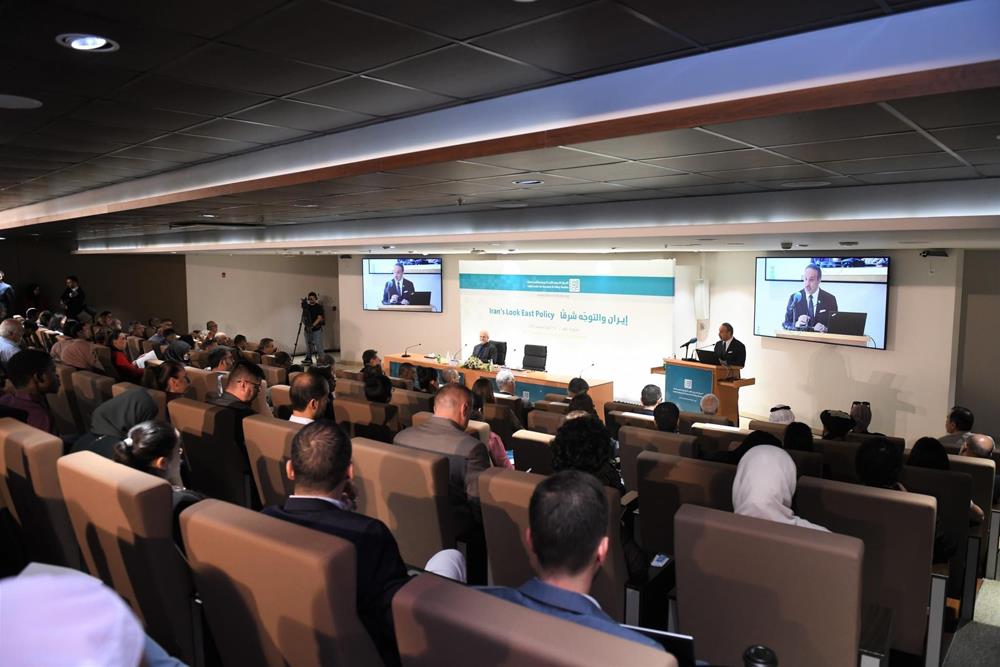(MENAFN- The Peninsula) The Peninsula
Doha, Qatar: The Iranian Studies Unit at the Arab Center for Research and Policy Studies launched its third annual conference on“Iran's Look East Policy” in Doha on Wednesday. The two-day conference features presentations by prominent Iran scholars as it also examines the origins, implications, challenges, and opportunities of Iran's“Look East” policy and its impact on regional and global actors. Open to the general public, the conference is being held in person and live streamed through the Arab Center's social media platforms.
The conference opened with remarks from Mehran Kamrava, the Head of the Iranian Studies Unit at the Arab Center and Professor of Government at Georgetown University Qatar.
Kamrava highlighted the significance and timely nature of the conference given that Iran has joined the Shanghai Cooperation Organization as a full member and was recently invited to join BRICS, further necessitating an examination of Iran's Look East policy.
The conference's keynote speaker, Seyed Mohammad Kazem Sajjadpour, Professor of International Relations at the School of International Relations, located in Tehran, discussed the reasons behind Iran's pivot to the East policy, as well as its challenges and opportunities.
Moderated by Mohamad Hamas ElMasry, the conference's first panel,“Iran's Look East Policy,” provided an overview of the Islamic Republic's orientation and approach toward the East and the possible development of a new world order. Diana Galeeva, at the University of Oxford, examined how Iran's collaboration with China and Russia under the new policy challenges the“liberal world order,” and how a new world order may emerge from new these alliances. Olivia Glombitza, at the AutonomUniversity of Barcelona and the Open University of Catalonia, discussed the ways in which Iran seeks to build bridges with its neighbors to the east such as Iraq and Pakistan.
She also discussed some of the main ways in which the Islamic Republic supplements its foreign policy with symbolic politics and tries to build and strengthen ties with others based on a common ideational worldview.
Kadhim Hashim Niama, Professor at Baghdad University, presented the merits and challenges of the Look East policy, arguing that the policy will likely continue in the foreseeable future, and, despite the difficulty of predicting its outcome, it is currently the most effective option for managing Iranian foreign policy.
Panel two, titled“Iran's Look East Policy and the Arab World” and moderated by Marwan Kabalan, tackled the policy's impact on the Arab region, Iraq and Egypt in particular. Harith Hasan, from the Carnegie Middle East Center, discussed how the“pivot to the East” has become part of the political and intellectual debate in Iraq, and how is it influenced by Iranian policy. He also explained the obstacles the pivot faces, and the nature of geostrategic and economic interests that characterize it. Huda Raouf, Professor at New Giza University, explored internal Iranian motives for pursuing neighborhood diplomacy, and the regional and international contexts that facilitate and hinder its success. She addressed Egyptian-Iranian relations as a model for Iran's endeavor to benefit from a regional détente and the Egyptian response to these attempts.
The third panel on Iran-Russia relations, moderated by Nikolay Kozhanov, began with Li-Chen Sim's, Assistant Professor at Khalifa University, analysis of Russian-Iranian economic relations and the extent to which Moscow contributes to Iran's Look East orientation. Abdolrasool Divsallar, from Milan's Università Cattolica del Sacro Cuore, offered insights into the perception of Russia inside the Iranian military-industrial complex. He argued that perceptions of Russia inside Iran's defense sector are largely positive, therefore turning it into a major advocate for a stronger partnership with Moscow. Lastly, Eric Lob, and Mazaher Koruzhde, from Florida International University and Howard University respectively, argued that recurring protests, economic sanctions, and other pressures inside and outside of Iran have made it more risk-seeking in pursuing its geopolitical goals of gaining concessions from theand its allies and partners in Western Europe and the Middle East.
The second and final day of the conference will take place on Thursday, September 7, 2023, and will continue to feature experts on Iran who will analyze Iran's relations with China, India, Malaysia, Central Asia, and the South Caucasus, as well as the risks and challenges of Look East policy and its impact on the economy and Iran's energy sector. In addition, it will feature discussions on the effects of sanctions on Iran's trade relations with major Asian countries. Interested members of the public can attend the conference in person at the Cultural building of the Arab Center. Simultanetranslation is provided in English and Arabic.



















Comments
No comment